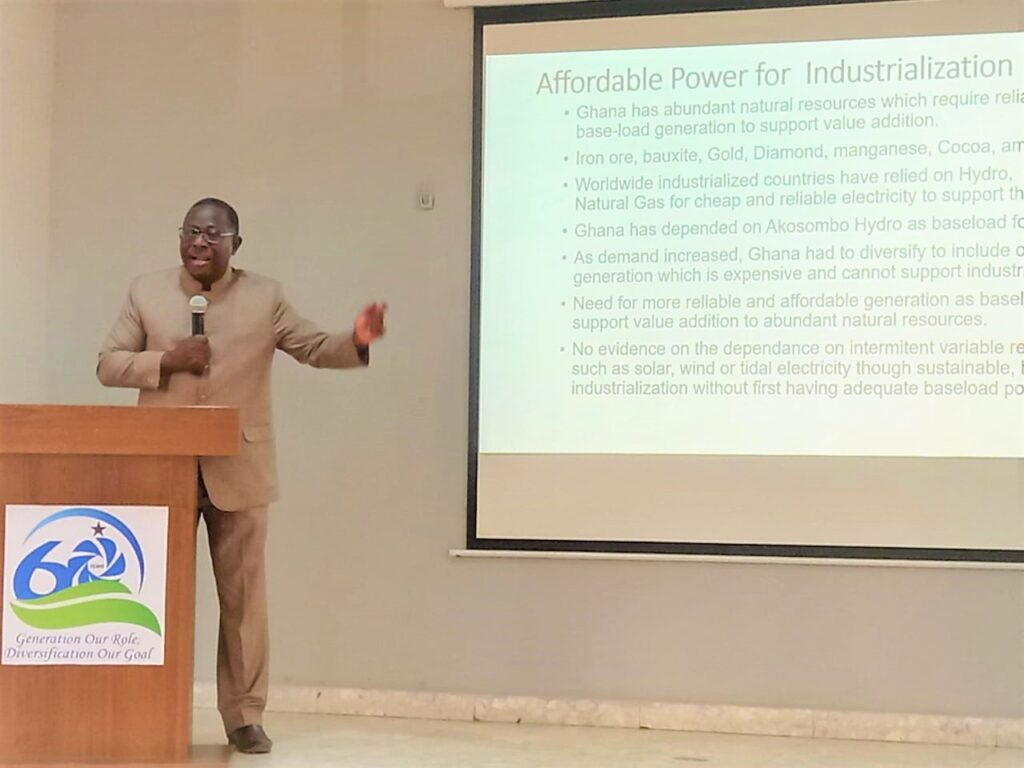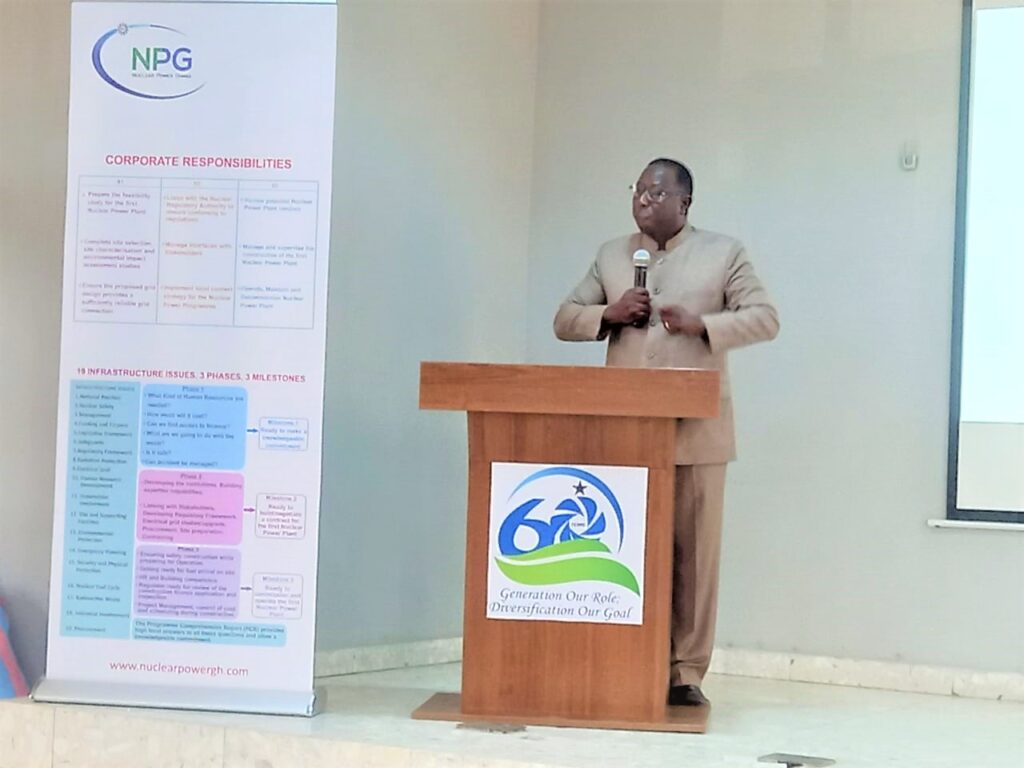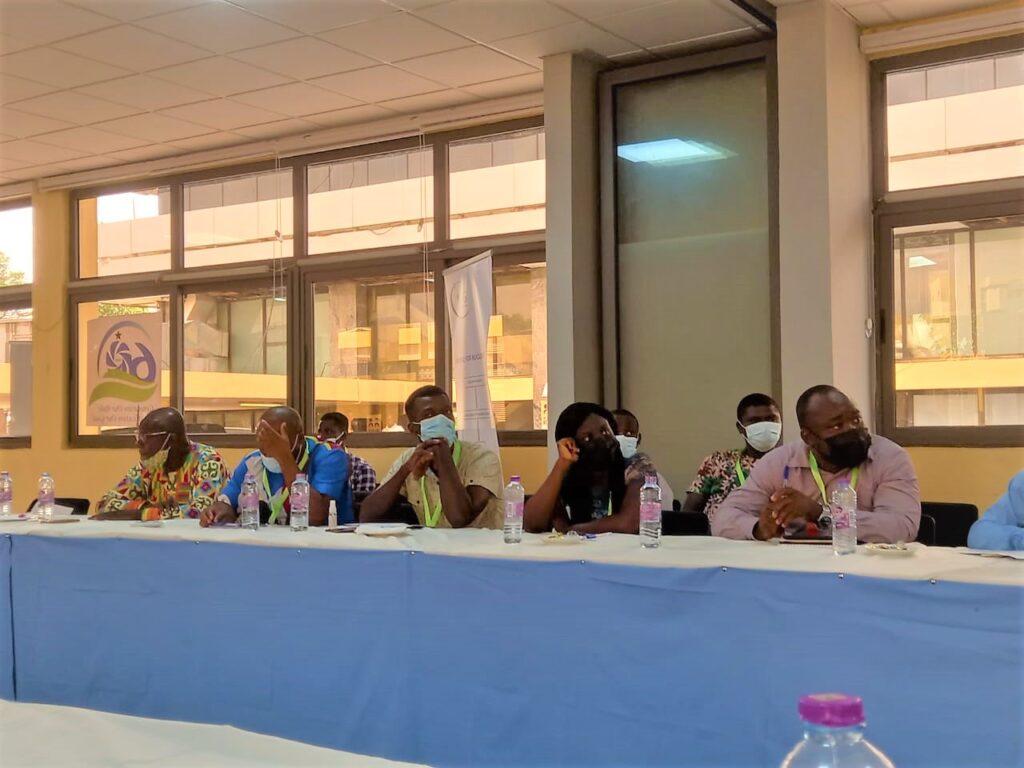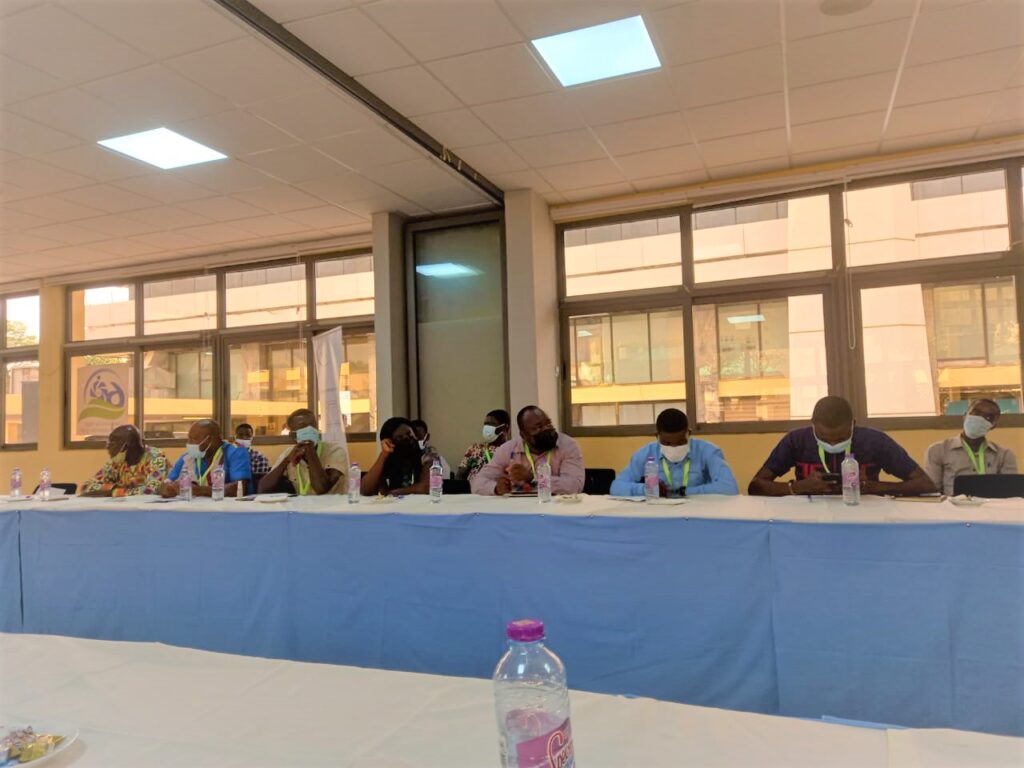Ghana has for so many years depended heavily on hydropower dams to generate electricity, which has formed the baseload of its energy. However, due to the growth in demand for power supply, the large hydro dams have become unreliable and cannot meet the baseload demand.
This, as a result, has often plunged the nation into intermittent power crises compelling the power authorities to shed loads among the public.
The Akosombo Hydro has served as a baseload for Ghana’s industrialization agenda. However, as demand increased, Ghana had to diversify to include oil-based generation which is expensive and cannot support industries.
It is in this direction that the country is exploring alternative sources of power and has placed Nuclear Energy on the government’s topmost energy priorities. This is because Nuclear Power presents some significant advantages over traditional energy sources.
Ghana’s projected electricity demand requires a baseload option that is resilient, secure, and sustainable. In pursuit of this high energy exploration, it paved way for the establishment of the Nuclear Power Ghana (NPG) in 2018.
The NPG is the project organisation set up to manage Ghana’s first nuclear power project. The NPG has been designated to be the eventual owner and operator of Ghana’s first Nuclear Power Plant.
Activities of the organisation began in 2018 when some staff of Volta River Authority (VRA), Bui Power Authority (BPA), and the Ghana Atomic Energy Commission (GAEC) were co-opted to form an initial core staff. In July 2019, NPG was duly registered under the Companies Code of Ghana as a Limited Liability Company.
As part of efforts to help journalists understand the industry issues as well as the generation of nuclear power, the NPG has partnered the Ghana Journalists Association (GJA) to hold a three-day training workshop for some selected journalists in Accra.
The workshop opened on Tuesday 30th November 2021 at the Electro Volta Hall, Head Office of the Volta River Authority (VRA) in Accra and is expected to end Thursday 2nd December, 2021.
The purpose of the training is to deepen understanding, sharpen skills, and encourage specialisation in reporting on issues related to nuclear power generation and its introduction into Ghana’s energy mix.
According to Ms. Linda Asante Agyei, Vice President of the GJA, who stood in for the GJA President Mr. Affail Monney, is to prepare journalists for effective and accurate reportage on Ghana‘s Nuclear Energy agenda.
“It is also meant to equip journalists with the needed information and skills on nuclear-related matters. The training would enhance advocacy and public education on the introduction of Nuclear Power into the country’s energy mix, to ensure better knowledge of the processes,” she said.
She further added that the training would place journalists on the right professional footing to report with insight and nuance while shaping the national discourse on energy policy.
She urged media organisations to restructure their editorial character and prioritise the establishment of energy desks to play a frontal role in securing Ghana’s energy future.
Speaking at the workshop, Dr. Stephen Yamoah, the Executive Director of NPG, said the role of journalists in effective communication, particularly on the processes leading to the establishment of Ghana’s first Nuclear Power Plant, was crucial to ensuring public understanding and acceptance of the project.
“It is therefore important for the media, which would drive the issues, to have a better understanding themselves, so that they could provide accurate information and education to the public to remove all the myths, fears, and misconceptions relating to nuclear power,” he said.
On his part, the Chief Executive Officer of the Bui Power Authority (BPA) Hon. Samuel Kofi Dzamesi, called for a proper understanding of the Ghana Nuclear Programme by the Media in order to send out the right message to the public on why Ghana should embrace the nuclear power agenda to support industrialization.
He revealed that Authority is a major shareholder of Nuclear Power Ghana Ltd., to provide reliable and affordable baseload power to support the integration of large-scale intermittent Renewable Energy sources from solar and wind power.
“The Authority has since its establishment in 2007 committed to the development of renewable and clean energy resources to augment the Country’s power generation sources. Bui Power Authority currently operates and manages the following power generation plants in the country: 404MW Hydropower Peaking Plant at Bui Generating Station (BGS), 50MWp (out of 250MWp) Land based Solar Park at BGS, 1.0MWp (out of 5MWp) Floating Solar PV Pack at BGS and 45kW Mini Hydro Plant on the Tsatsadu Falls at Alavanyo Abehenease in the Volta Region,” he said.
He observed that so far, there is no evidence on the dependence on only intermittent renewable sources though sustainable, having supported industrialization without first having adequate baseload power from hydro, coal, natural gas, or nuclear.
“This is why Bui Power Authority is committed to supporting Nuclear Power Ghana Ltd to develop the first Nuclear Power Plant in Ghana. Nuclear is clean and emits no carbon dioxide unlike coal and other thermal power plants. Ghana has abundant natural resources which require reliable and affordable baseload electricity to support their value addition. We have Iron ore, Bauxite, Gold, Diamond, Manganese, and other minerals underneath the earth. We also have rich agricultural land for the production of food and cash crops such as maize, rice, cocoa, timber, rubber among others. What we need is cheap source power for value chain addition,” the BPA Boss indicated.
He recalled that between the year 2000 and 2020 for instance, electricity consumption by the industrial sector which is the backbone of Ghana’s economy did not see any significant increase in power demand as most industries have folded up due to the high cost of electricity from oil based thermal power plants.
He said VALCO is currently operating only 2 pot-lines hence the need for more reliable and affordable electricity generation as baseload power to support value chain addition to the abundant natural resources is therefore very necessary.
“For now, Natural Gas (NG) besides hydropower remains one of the most sustainable and relatively cost-competitive fuel supply to produce affordable power in Ghana. Indeed, significant progress has been made to transition the oil-based power generating plants to run on Natural Gas. Experts estimate that the Natural Gas production from the available reserves in Ghana are expected to decline in the next decade or so unless new gas reserves are discovered.
….How to ensure a sustainable supply of reliable and affordable baseload power for Ghana’s industrialized agenda is therefore of great concern that requires immediate action. The Development of Nuclear Power takes time as it has to pass through the International Atomic Energy Agency’s rigid regulatory procedures to ensure the safety of the power plant and this is why we have to start now.”
In her welcome address, Ms. Bellona-Gerard Vittor-Quao, Manager, Public Affairs, Nuclear Power Ghana said the training workshop honoured one of the key obligations underpinning a signed collaboration with the GJA.
“It would be recalled that in September 2020, the Nuclear Power Ghana and GJA agreed to a partnership to promote and sustain Media involvement through knowledge sharing, and to widen information reach, on Ghana’s efforts to include Nuclear Power as an alternative baseload in its generation mix,” she said.
Reflecting on the theme for this workshop, “Ghana Steps into Nuclear Future”, she said the theme is resonant with the call by world personalities at the just ended COP26, at Glasgow, for the urgent transformational actions that must be taken as a rapid race to beat the climate emergency and limit dangerous global heating.
“As the world stands at this critical juncture in our collective efforts, the solidarity and flexibility of special purpose vehicle needed to carry out this rapid and deep change in the way we do business, how we generate power, how we build cities, how we move, and how we feed the world is the Media. The call by the UN Sec-General, Antonio Guterres to governments, not only to honour their national contributions under the Paris Agreement but engage the media in their need to substantially increase their ambitions, advance efforts to achieve all the Sustainable Development Goals is the prescribed solution to holistic engagement.”
She assured journalists that the NPG is therefore committed to this solution to equipping the media with the requisite skills and needed information to effectively execute their responsibilities accountably.
Ms. Bellona-Gerard Vittor-Quao added that accurate and reliable communication on sensitive issues in a technical and specialised field such as Nuclear Science and Technology are as significant and as essential, and this underscores the importance of specialised energy reporting which should be a major component as information managers.
“Nuclear Power is promising and its benefits to the country are enormous, therefore, together, we ought to ensure that the objectives of this Project are realised and the needed social license for the project is secured. It is noted that the global nuclear industry stands ready to play its essential role in this energy transformation. The move to build a nuclear power plant is more than just a demand for clean energy – it means new jobs, new education, contracts for local industry, economic growth, and improved quality of life for our people.”
She called for the full support of all journalists to make the project a success.
“Again, NPG is keen on establishing a steady and well-bonded relationship with its stakeholders through the media as a special purpose vehicle to reach all corners of the country for effective involvement and engagement. This Workshop, therefore, will provide all of you with the opportunity to refresh your knowledge, improve your capacity and equip you to support Ghana’s Nuclear Power efforts.”
She maintained “The NPG cannot do it alone: we need a concerted effort between government,industry, and obviously civil society and you our media to put in place what is needed to build Ghana’s first Nuclear Power Plant, accelerate industrial development with a sustainable, reliable, and affordable source of electricity. Together with you, the media, we can reach this new society with clean, fair and abundant energy for everybody.”



























































